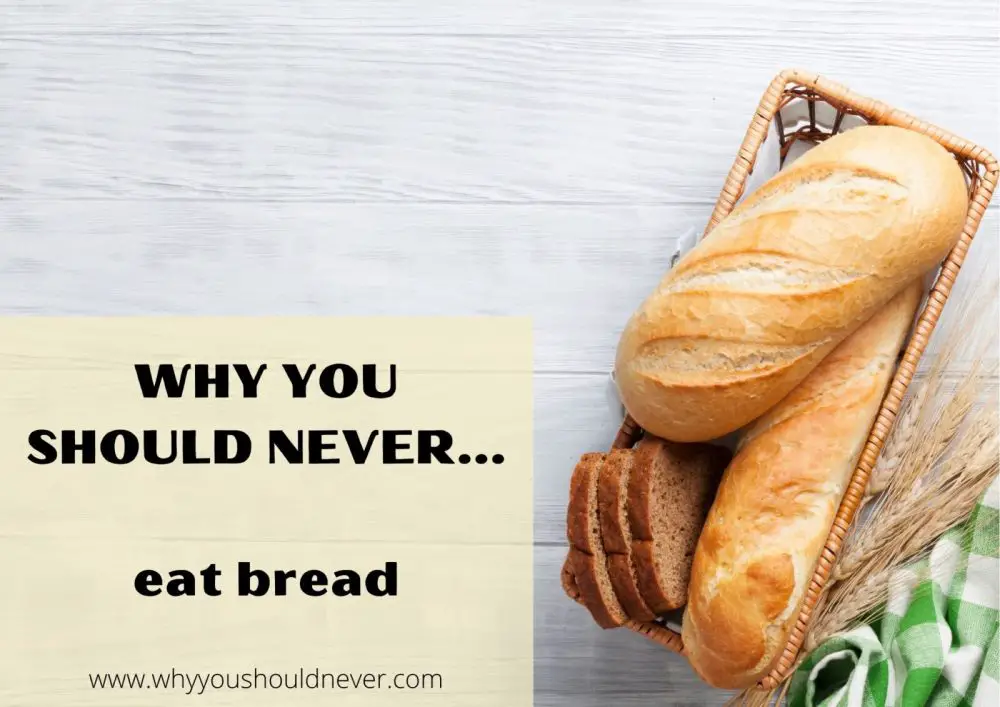![]()
Why You Should Never Eat Bread
Who doesn’t love bread?!
Research suggests that bread, in some form or another, has been around for over 14 thousand years. In that time, it’s become a staple food in most countries across the globe.
Statistics show that, on average, people eat a whopping 55 loaves of bread each year! So it’s safe to say that this delicious, somewhat addictive foodstuff is much-loved and unlikely to go out of style any time soon.
However, the bread we consume today is a far cry from the stuff our ancestors used to make, and it is this difference that makes consuming bread an unwise decision.
In this article, we’ll discuss why you should remove bread from your diet altogether.
It’s high in bad carbohydrates, which makes you gain weight
One of the main reasons why so many people include bread in their diets is because it’s incredibly filling, and this is due to its high carbohydrate content.
While our body needs carbohydrates, some carbs are better than others, and unfortunately the ones found in bread, particularly in white bread, are known as “refined carbs.”
These are grains that, due to them being processed, have lost most if not all of their nutrients – like fiber and vitamins – making them “empty carbs/calories”.
These types of carbs are the ones that make you gain weight, due to the amount of sugar they contain. The body converts this sugar to fat, which is stored in the body.
It’s high in simple sugars, which lead to diabetes
As mentioned above, bread is made up of processed/refined carbs. These are bad for you because they are simple sugars.
These sugars are broken down quickly in the body, causing your insulin levels to spike.
When these spikes occur, your pancreas will start to generate more and more insulin in order to control the high amounts of glucose entering the body from the sugars.
In doing this, the pancreas eventually develops a resistance to insulin, and this insulin resistance will lead to type II diabetes.
Can cause a host of stomach problems
Bread is made up of wheat, and for people with gluten sensitivity or celiac disease, wheat can irritate the gastrointestinal tract, causing bloating, constipation, and other digestive problems like diarrhea.
The reason being: wheat is difficult for your body to digest, and if you’re unable to digest something, your gut bacteria will ferment it, which leads to bloating.
Bread contains lots of harmful additives
It’s all very well if you’re baking the bread yourself from scratch, because you’ll likely only use the original 4 ingredients (flour, water, yeast and salt).
Sadly, the bread we consume today is store-bought and mass produced, thus the vast majority of bread is packed with additives, preservatives and some other harmful additions. Some of these include:
-
bleach to make the flour white
-
enzymes that are classified as processing aids and don’t have to be declared on the ingredients label
-
emulsifiers like sodium stearoyl lactylate (SSL) that strengthen the dough and soften the crumbs
-
fermentable sugars and processed oils (e.g. canola oil) that make bread taste better
-
preservatives to extend shelf life
Some of these ingredients, like enzymes and bleach, could be toxic and/or cause allergic reactions.
Suggestions
Bake your own bread
Bread is one of the easiest things to make from scratch, and there are a gazillion different recipes to try.
If you make your own bread, it will be fresh and won’t contain any of the harmful ingredients found in processed, store-bought bread.
Stay away from white bread
White bread is the worst kind, as it carries hardly any nutrients. Instead, opt for whole grain and seeded loaves, which aren’t nearly as bad, and will give you plenty of nutrients whilst also filling you up.
